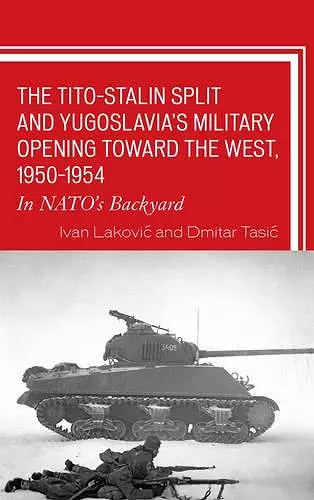The Tito–Stalin Split and Yugoslavia's Military Opening toward the West, 1950–1954
In NATO's Backyard
Ivan Lakovic author Dmitar Tasić author
Format:Hardback
Publisher:Bloomsbury Publishing PLC
Published:14th Jul '16
Currently unavailable, and unfortunately no date known when it will be back

Yugoslav military cooperation with West emerged after the country’s split with the U.S.S.R. and its allies in 1948. It came as a surprise for many, since Yugoslavia used to be one of the staunchest followers of Soviet politics. However, faced with possible military escalation of the ideological, political, and economic worsening of relations with the East, the Yugoslav leadership quickly turned to their former “class enemies.” For the United States, it presented an opportunity to acquire many unexpected political benefits. Yugoslav alienation from the Kremlin provided territorial consolidation of the southern flank of NATO, denial of direct approach to the Adriatic Sea and Northern Italy to Soviet troops, and dealt a strong political blow to the homogeneity of the Eastern bloc. While not insisting on changing the ideological nature of Yugoslav state, the United States provided much needed material and financial aid, developing the base for entering into sphere of military cooperation. It had two main categories—direct support for Yugoslav forces through shipments of military equipment, as well as Yugoslavia entering into defensive, military alliance (the Balkan Pact) with Greece and Turkey, already full members of NATO. Such trends, aiming towards closer Yugoslav bonding with Western military and political structures, ended in the mid-1950s with Stalin’s death, the outbreak of the Trieste crisis, and Tito’s reconciliation with Soviet leadership. Developing the new policy of non-alignment with either of the confronting blocs, Yugoslavia stepped out from the program of Western military aid, while the Balkan Pact slowly faded in growing animosity between Greece and Turkey.
In this indispensable book, Lakovic and Tasic display a nuanced understanding of the interplay of ideological, political, and military aspects in the early postwar period in their examination of the unlikely cooperation between communist Yugoslavia and the West. -- Vladimir Petrovic, Central European University
Meant to bring Yugoslavs, Turks, and Greeks together, Lakovic and Tasic unveil the untold story of the Balkan Pact, an unusually strange, yet forgotten, alignment of the early Cold War years. Providing in-depth analysis of the events leading to its formation, this book is the first comprehensive effort to bring the Balkan Pact to the attention of Western readers. This book highlights how the exigencies and concerns of the prospect of a Soviet-satellite attack similar to what happened in Korea loomed large in Belgrade and oriented the Yugoslav leadership toward Washington. It sheds light on how Cold War dynamics set off by the death of Stalin took the wind off from the sails of the budding Pact and brought its ephemeral voyage to a halt. Lakovic and Tasic also draw readers’ attention to local problems such as Cyprus issue, which played the role of catalyst for weakening the cohesion of the Pact and gave opportunities to Joseph Broz Tito to portray himself as one of the pivotal statesmen of the emerging Movement of Nonaligned Countries. A definitively fresh look of the repetitive narratives of the Cold War. -- Gencer Özcan, Istanbul Bilgi University
This book represents an important contribution to understanding the complex political dynamics of the Balkan region in the early period of the Cold War. Based largely on documents from Belgrade archives, this is the first comprehensive English-language study analyzing Yugoslavia’s careful rapprochement with the West in the years following the Tito–Stalin break. The authors provide deep insight into the strategic thinking of Yugoslav leaders and the difficult choices they faced in light of a potential Soviet military invasion, and they explain how Belgrade eventually managed to pursue a rather successful policy of balancing between the blocs after Stalin’s death and the easing of tensions in East–West relations. -- Jeronim Perovic, University of Zurich
From Yugoslavia's expulsion from the Cominform to the Tito–Khrushchev reconciliation, the major topics of this highly recommended study include the initial approach to the West for military support that culminated in the 1951 agreement, the agreement's gradual decay through 1957, and the rise and decline of the Balkan Pact with Greece and Turkey. Based on Yugoslav sources and declassified documents, this work is an outstanding and original account of Yugoslavia's search for security. -- Zachary T. Irwin, Penn State Behrend
An excellent and insightful study backed up with in-depth research. -- André Gerolymatos, Simon Fraser University
ISBN: 9781498539333
Dimensions: 233mm x 160mm x 29mm
Weight: 626g
300 pages